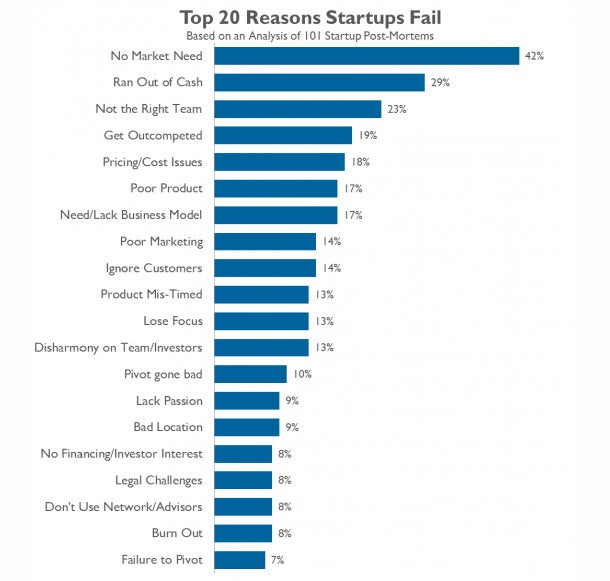I started my first company when I was 25. I was a reluctant entrepreneur. My sales abilities outgrew three companies, and I couldn't seem to manage the politics necessary to get where I wanted to go at the speed I wanted to get there. So I took a deep breath, opened a company in 1989, and never looked back.
But in my journey of building four businesses and making the Inc. 500 list, I often found I saw the world differently then many in my circle. I would struggle with communication and empathy, as would the people around me. My family and my friends would never quite understand why I took action with such passion and drive. Though they would be continuously fascinated how I could make things happen from what seemed like unrelated connections and events.
Employees appreciated my drive, but still considered me a puzzlement. They couldn't imagine taking the risks and responsibility of building a company, and I couldn't imagine not having control of my own destiny. I have spent decades in the close company of more than 1000 entrepreneurs in public session like Inc. conferences and in private forums like theEntrepreneur's Organization (EO). I have come to learn that we have similar ways of viewing the world and creating lifestyles. It's not for everyone, but it works for us.
If you are an entrepreneur, you need to articulate the six concepts below so the people in close proximity can comprehend your behavior. And for those of you engaged with an entrepreneur, I hope the tips below shed some light and give you some guidance to enjoy the ride.
1. Entrepreneurs are benevolent narcissists. There is no question that many entrepreneurs act as though they are the center of the universe. Once I get a vision in my head, it stays at the forefront of my mind until I either eliminate it or execute on it. Over time, I have learned that in order to make visions come true, I must constantly sell and recruit people to my mission. That means talking about my ideas and actions... a lot. So yes, my world revolves around my vision and ambition. That is the narcissistic part.
But unlike most self-centered people, most successful entrepreneurs aren't in it just for themselves. They love to bring other people along for the ride. Making others happy, wealthy and successful drives entrepreneurs. They create companies to benefit society with their products and services. They may interpret that benefit differently than most people, but few are motivated by pure exploitation.
Tip: The next time you feel ignored by an entrepreneur, ask them how you can get involved and benefit from their activities. You may be surprised at the opportunity that opens up.
2. Entrepreneurs evaluate risk differently. The term risk-taker is often associated with entrepreneurs. Most entrepreneurs don't believe they are taking risks by opening businesses and growing companies. Gone are the days of institutions that provide steady employment and guaranteed retirement. I personally lost everything in the 2008 collapse of the banking industry. But I have many friends who spent 30 years as employees in that field and also went through great hardship. I was able to rebuild by taking advantage of opportunity and being agile while many of them are still trying to reconstruct their lives.
Entrepreneurs know the only safety net they can bank on is their own ability to leverage knowledge, resources and relationships to build something from nothing. They believe there is greater risk in being boxed in to a structure than to venture out to new horizons. That all being said, many of us have learned to overcome our material desires and put a little away for those rainy days.
Tip: Don't assume that actions taken by entrepreneurs are careless or not well considered. If you have concern, ask about the process or diligence. You might be surprised what you learn.
3. Once entrepreneurs decide to take action, they commit. There is an incorrect assumption about most entrepreneurs that they are impulsive. The image of people ideating all over the place and randomly straying from project to project is one that is constantly portrayed in media and is most often a mischaracterization. Most of my successful entrepreneurial friends are actually quite disciplined and focused. They have learned to create structure where there is none. They have a set process for evaluating opportunities and are wary about taking on a new project without vetting it carefully.
But once the due diligence is done and action is required seasoned entrepreneurs will commit all necessary time and resources to making the dream a reality. They have no tolerance for doing things halfway. The project may fail, but the entrepreneur will only be satisfied if it does on its own merits. Then it's time to learn and move on to the next entrepreneurial venture.
Tip: Entrepreneurs in motion are a force of nature. Either get out of the way or support the activity whole-heartedly. Dipping your toe into their projects will only create static and dissatisfaction for everyone involved.
4. Entrepreneurs feel angst about time. There are very few new ideas out there. Hardly anything comes up today that hasn't shown up in a science fiction novel or movie from decades ago. The innovation comes from ways to execute those ideas in a manner that can support the market and a profitable business model. For every entrepreneur attempting to find that perfect path to success, there are many competitors nipping at their heels. Some have smarter people, more money or better partners. Some have all of the above. But that's the game. And to the victor goes the spoils.
Once I complete a vision in my head, it's a race against time to see if that dream becomes a reality. The more complexity involved with the vision, the more challenging time becomes as a factor for success. This is where I use my creativity every day, to figure out how to get from point A to Point B the fastest way possible without sacrificing stability or harming anyone along the way. Executing on my need for speed sometimes results in my being less polite, considerate or reverent than people expect. It's not that I don't care. It's that sometimes I am moving so fast I forget to show it.
Tip: Give entrepreneurs the benefit of the doubt when expecting niceties. You don't need to put up with rudeness, but you can gently remind them that not everyone moves at their pace and others need consideration to feel respected.
5. Every day with positive cash flow is a good day. I remember a few years back being at EO event in Hong Kong at the end of the month. My wife at the time and I were laughing because all around the hotel you could hear the same stressed mobile phone conversations going on about whether or not the attendees had made their payroll obligations for the month. Growing a company requires resources, especially cash, and most entrepreneurs will stretch those limits to make progress quickly in the marketplace.
The lack of resources to battle the competition is usually the number 1 stress point for an entrepreneur. The most painful days in my life have been when I could not meet my financial obligations. Those are the days I feel guilty and inadequate. Those are the days I feel the pain of those who depend upon me. As an entrepreneur I understand that family, partners and employees put their trust in me to help them achieve financial stability. I understand that they do not choose my life because they don't want to risk instability. As long as there is money in the bank to continue the path forward, every other challenge is minor.
Tip: Don't assume entrepreneurs are primarily motivated by greed. Certainly they enjoy the rewards that come with success, but they are driven to achieve the security that comes with strong liquidity and cash flow.
6. For entrepreneurs, working means fun and relaxation. Contrary to popular belief, most entrepreneurs are not workaholics. I describe work as the things we have to do in order to do the things we want to do. Some people like to play sports or dance or do woodcraft as a hobby. Entrepreneurs love to build businesses. We get excited about opportunity, networking and product development. When I sit at a Yankees game, I amuse myself by calculating the per-attendee revenue and cost of services to figure out how much money is being made. When I run a 5K or kayak, my brain lets loose with creative ideas that can either improve my business or create something new from the resources I have.
I feel blessed that the things I love to do are also the things that make money and give me a sense of accomplishment. When I need to rest my brain and body, I do so. But very soon, I go back to doing what I love because I enjoy it and it makes me happy.
Tip: No need to ever tell an entrepreneur to slow down or take time off. It's like trying to teach a pig to sing. It just wastes your time and annoys the pig.
From Inc. Magazine







